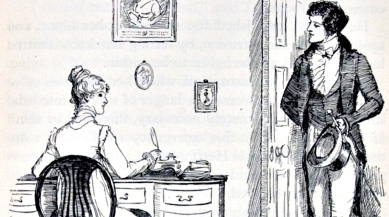jux·ta·pose
verb \’jək-stə-,pōz\
: to place (different things) together in order to create an interesting effect or to show how they are the same or different
Long before we knew what juxtapose meant or had even heard of the word, my sister and I were busy “juxtaposing” things—and by things, I mean unsavory foods that we were forced to eat by a concerned and conscientious parent—like liver and mashed potatoes. Not that there’s anything essentially wrong with mashed potatoes…it was the combining them with the liver that we had the problem with. And nothing against liver—it is, after all, an essential organ, but I believe most people will agree with me that children generally find it disgusting. Parents should acknowledge this universal truth.
My sister’s bright idea was that we pretend that the liver was chocolate and that the mashed potatoes were whipped cream. That way we could trick ourselves into thinking we were eating dessert instead of something “gross-ning” (which was a favorite non-word word when we were in elementary school).
It worked…sort of. Eventually my mom stopped serving us liver and mashed potatoes for dinner, so we were able to eat our dinner like normal people, instead of being forced to mentally play with our food. More importantly, we were free to apply our creativity to more worthwhile endeavors.
Still, our little thought experiment/exercise in imaginative eating taught me that it pays to combine something you like with something you like not so much, especially when the not so liked thing is something you have to do. I find this technique has gotten me though many of life’s less than pleasant, un-rose garden moments. Sort of like what Mary Poppins said about that spoonful of sugar.
Which brings me back to my series of articles on Everything (About Job Interviews) I Learned From Jane Austen, which is all about how to make that awful medicine—the job interview—a touch more palatable.
Here is a brief summation of our tips so far:
Tip 1: Do master the indirect boast
We learned how to answer “What’s your worst quality?” or “What’s your biggest weakness?” by watching Mr. Bingley. You can learn a lot by watching people. Case in point:
[youtube https://www.youtube.com/watch?v=c1yp750t_xk?rel=0&w=420&h=315]
…uh, back to Bingley. Remember how he “modestly” said his letters were crazy/sloppy/jumbled up because he thought faster than he wrote? Sloppy letters writing skills might sound like a weakness until you realize they are the product of a quick mind/brilliant brain. Bingo! Now that question will never stump you again.
Tip 2: Don’t bad-mouth a former employer
When an interviewer asks an interviewee “Who was your worst boss?” he/she’s not inviting you to relate some epic tale of dragon boss man/boss lady. It’s more like a test of your maturity level and discretion. Don’t fail…don’t be a Wickham. Bad-mouthing a former boss is just wrong.
Tip 3: Do become a world-class networker
This is probably the one and only time it is okay to make Mrs. Bennet your role-model. Feigning sickness and nagging your family will only annoy and alienate people—like your husband who will promptly retire to the library, the one place he know he will be safe from you because you…don’t…read—so don’t model that behavior. Imitate her savant-like ability to network.
Tip 4: Don’t show up slovenly dressed
Elizabeth Bennet provides the basis for this tip when she shows up at Netherfield with petticoats drenched in mud (after traipsing through the countryside). Perhaps she was trying to demonstrate her indifference to and disregard of Mr. Darcy and his 10,000 pounds per annum. As an candidate for a job, you cannot afford to make such a statement. Show up neat and tidy, pressed and shaven, i.e., dress for success.
Tip 5: Do stay on topic when “telling about yourself”
Everyone needs a opening, so interviewers often start by saying, “Tell me about yourself.” Lady Catherine de Bourgh shows us how to turn this conversation-starter into an opportunity to share relevant bits of data about our suitableness for the job.
Tip 6: Do send a thank you note
I promise, no one will find you ridiculous if you copy Mr. Collins’, er, enthusiasm about showing himself grateful by sending a post-interview thank you card/note/letter/email. However, if you approach Mr. Darcy and start talking without a formal introduction, you’re going to get royally snubbed.
So, there we are…tips 1-6 in list format. We have yet to hear from Mr. Darcy, Caroline, Georgiana, Jane, Lydia, Kitty, Mary (oh, dear), Mr. Bennet, or any of the Lucases. The possibilities are endless, so I’ll be revisiting this sometime in the near future. In the meantime, I’ve been working on some other projects (and desperately trying to get this blog rhythm down!).
See you next time.


